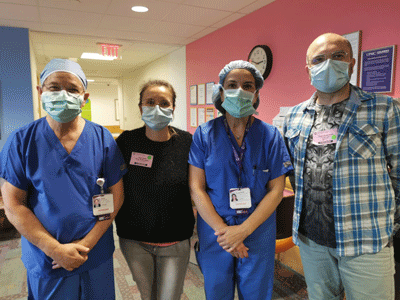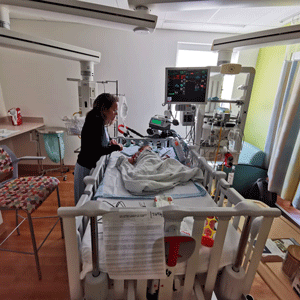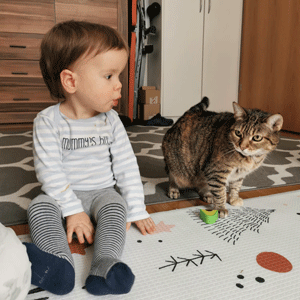My family and I live in Krakow, Poland. When I was 29 weeks pregnant, a check-up that was supposed to be just a formality turned into a parent’s worst nightmare. My test results had been great so far, and I was taking care of myself. I was anxious about my pregnancy as probably every mother-to-be is — but it never crossed my mind that my child could be seriously ill.
During a prenatal echocardiogram at 29 weeks, we found out that our son, Filipek (whose nickname is Filip) had a severe form of Ebstein’s anomaly, a very rare heart defect. His condition was critical and would require surgery. Filip was born in critical condition via Caesarean section on Sept. 17, 2019, at 34 weeks. He was immediately intubated and connected to a ventilator. The nurses baptized him and, as he fought for his life, we knew his chances of survival were slim. We could only pray for a miracle.
On November 13, Filip had a systemic pulmonary anastomosis, or shunt procedure, and an artificial heart vessel was inserted. The procedure helped, but his heart and circulation problems still remained. After 14 long weeks in the hospital, we were able to bring our son home. But he was still weak. Always tired, he didn’t have the strength to eat, and breathing was a struggle. Healthy children breathe about 30 times a minute. Filip took 80 breaths a minute. He couldn’t get enough oxygen, and his skin was blue. Our doctors in Krakow did everything they could to help him, but our options in Poland were slim and hard to schedule.
Signs of Hope
I first learned about Dr. José Pedro da Silva and the cone procedure through our Polish cardiac surgeon. I didn’t even know that the Da Silva Center for Ebstein’s Anomaly was located in the Heart Institute at UPMC Children’s in America. We were looking for any options to consider. One evening, I posted in an Ebstein’s anomaly parent support group on Facebook asking for advice. I posted in the group at 10 p.m. By 4 a.m., I had a response from Dr. Luciana da Fonseca da Silva, pediatric cardiothoracic surgeon at the Da Silva Center, who also is Dr. José’s wife. She wrote back so quickly that I couldn’t believe it was real. She offered to consult with Filip’s surgeon on his case, but our doctor in Krakow said Filip’s case was too severe, that even Dr. Luciana and Dr. José couldn’t help. But I knew I had to try. Two months later, I sent Dr. Luciana a long email detailing our situation and Filip’s state. I shared with her all of his medical images, tests, and reports. The Da Silva Center at UPMC Children’s reviewed his information and gave us the answer we could barely hope for: “We can do it.” 
Hearing that there was a chance for our son gave us new hope. We had heard time and again from our doctors in Poland that there was so little to be done, if anything at all, and because of that we were afraid to hope. But we did everything we could. Filip didn’t have much time — the oxygen saturation in his blood was too low. As Dr. Luciana said, “we were racing against time.” He needed to have the surgery within two months, and the COVID-19 pandemic had just started. We had to raise funds for the medical flight and surgery, an amount impossible to earn in Poland even over the course of an entire lifetime. We didn’t have any American health insurance to help offset the cost, and in 2020 the exchange rate of the Polish złoty was only a little more than 25 cents to the U.S. dollar. We also had to pray that even with the pandemic, UPMC Children’s would be able to admit us. We set up an online fundraising page, and over 26,000 people from all over the world donated. My friends organized auctions and fundraisers over Facebook. The support we received was just amazing. Miraculously, all the pieces came together.
In the Steel City
We arrived in Pittsburgh on July 7, 2020. After 14 days of quarantine staying at an apartment in the South Side, we went to our appointment at UPMC Children’s. It was there we met Neal Smalley, senior referral liaison for UPMC Children’s International Services team. Neal was wonderful. Throughout our entire stay, it felt as though I was talking with a close and dedicated friend, that we were his own family. Neal’s sincerity was amazing. His communication was clear and supportive, and he made us laugh during the lighter moments. He’d sing “Twinkle, Twinkle, Little Star” and other songs to Filip and me, and, to this day I still get emotional when I hear Janis Joplin’s “Mercedes Benz”. 
On July 23, Dr. Luciana and Dr. José performed Filip’s heart procedure, and Dr. Bryan Goldstein performed his catherization. Filip was in the hospital for two weeks, during which time we stayed at Ronald McDonald House Pittsburgh, which is attached to UPMC Children’s. At our hospital in Poland, if your child was staying in the hospital, there is no opportunity to sit with them. It is difficult and stressful for both parents and children. UPMC Children’s could not have been more different. The facility was so welcoming, with a comfortable and clean room for Filip to stay in while he recovered. For the first three days after his procedure, Filip was unconscious. Though we could have stayed with him overnight, my husband and I knew that we needed to rest and prepare ourselves for his recovery. Seeing how the nurses cared for Filip, we felt completely safe leaving him in their hands for those few hours.
After Filip woke up, either I or my husband, or both of us, were with him constantly, day and night. Our social workers helped us with anything — big or small — to make our stay as easy as possible. I can’t say enough about the amazing people who work at UPMC Children’s. The international team of nurses, cardiac surgeons, cardiologists, anesthesiologists, pediatricians, and doctors — everyone was so heartfelt, sincere, and professional. They made sure to explain every medical procedure, taking the time to make sure we understood all the details.
To my family and me, Dr. Luciana and Dr. José are angels in human form. If we had the power, we’d award them a Nobel Prize for the skills and innovation they have developed and introduced into the world of cardiac surgery. The Da Silva Center had the courage and confidence to invite us to Pittsburgh from the other side of the world in the middle of a global pandemic. We came from a very difficult situation, with very little hope, and they looked out for us throughout our entire journey: before admission, during our stay, and after discharge. Now back home in Poland, we are still in touch with Dr. Luciana, who is monitoring Filip’s health. We are frequently sharing pictures and videos through WhatsApp. 
In Krakow, I’ve felt a responsibility to make the services and care provided by the Da Silva Center as widely known as possible. I want to make sure that other like ours know that there is hope, that there is a place in Pittsburgh that they can go to and trust. We are so thankful for the family and community that the Da Silva Center has given us.









